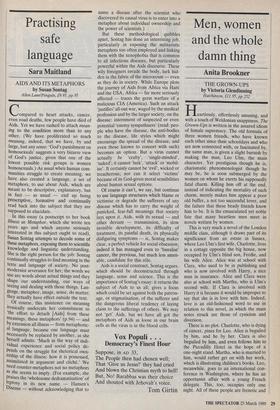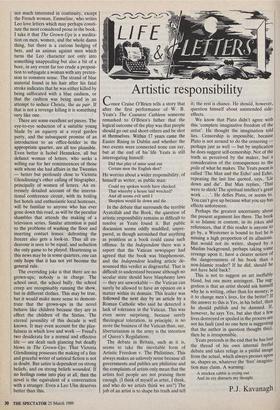Men, women and the whole damn thing
Anita Brookner
THE GROWN-UPS by Victoria Glendinning Hutchinson, £11.95, pp.252 1-1. eartlessly, effortlessly amusing, and with a touch of Weldonian snappiness, The Grown-Ups is written in the assured idiom of female supremacy. The old formula of three women friends, who have known each other since their schooldays and who are now connected with, or fascinated by, the same man, is given a slight burnish by making the man, Leo Ulm, the main character. Yet prestigious though he is, charismatic phenomenologist though he may be, he is soon submerged by the women on whom he exerts his supposedly fatal charm. Killing him off at the end, instead of indicating the mortality of such charm, merely makes him appear a poor old buffer, a not too successful lover, and the failure that these beady friends know him to be. It is the emasculated yet noble fate that many heartless men meet in novels written by women.
This is very much a novel of the London middle class, although it draws part of its significance from an estate in Sussex, where Leo Ulm's first wife, Charlotte, lives in a cottage opposite the big house, now occupied by Ulm's blind son, Ferdie, and his wife Alice. Alice was at school with Clara, who used to be in publishing and who is now involved with Harry, a nice man in insurance. Alice and Clara were also at school with Martha, who is Ulm's second wife. If Clara is involved with Harry it is because it would be improper to say that she is in love with him. Indeed, love is an old-fashioned word to use in relation to this novel, in which the main notes struck are those of cynicism and diversion.
There is no plot. Charlotte, who is dying of cancer, pines for Leo. Alice is beguiled by him, and he by her. Clara is also beguiled by him, and even follows him to the Piccadilly Hotel in the hope of a one-night stand. Martha, who is married to him, would rather get on with her work, which is illustrating children's books. Leo, meanwhile, goes to an international con- ference in Washington, where he has an opportunist affair with a young French delegate. This, too, occupies only one night. All of these people are frenetic and not much interested in continuity, except the French woman, Emmeline, who writes Leo love letters which may perhaps consti- tute the most considered prose in the book. I take it that The Grown-Ups is a medita- tion on men, women, and the whole damn thing, but there is a curious hedging of bets, and an animus against men which turns the Leo character not only into something unappealing but also a bit of a bore, in any event far too crude a proposi- tion to subjugate a woman with any preten- sion to common sense. The strand of blue material found in his hair after his fatal stroke indicates that he was either killed by being suffocated with a blue cushion, or that the cushion was being used in an attempt to seduce Christa, the au pair. If that is not a revenge killing it is something very like one.
There are some excellent set pieces. The eye-to-eye seduction of a suitable young blade by an equerry at a royal garden party, and the subsequent promise of an introduction to an office-holder in the appropriate quarter, are all too plausible. Even better is Isobel Henneken, all but defunct woman of letters, who seeks a willing ear for her reminiscences of those with whom she had affairs in the Twenties — better but perilously close to Victoria Glendinning's other calling of biographer, principally of women of letters. An ex- tremely detailed account of the interna- tional conference circuit, with its boiling hot hotels and enthusiastic local hostesses, will be familiar to anyone who has ever gone down this road, as will be the peculiar shambles that attends the making of a television series. Similar attention is paid to the problems of washing the floor and inserting contact lenses: defrosting the freezer also gets a look-in. Thus all en- deavour is seen to be equal, and seduction the only game to be played. Heartening as this news may be in some quarters, one can only hope that it has not yet become the general rule.
The overriding joke is that there are no grown-ups; nobody is in charge. The school swot, the school bully, the school creep are recognisably running the show, but in different clothes. This may be true, but it would make more sense to demons- trate that the grown-ups in the novel behave like children because they are in effect the children of the Sixties. The eternal juvenility of this decade is well known, It may even account for the play- fulness in which love and work — Freud's two desiderata for a normal and effective life — are dealt such glancing but deadly blows in The Grown-Ups. That Victoria Glendinning possesses the making of a fine and graceful writer of satirical fiction is not in doubt. But satire is dependent on strong beliefs, and on strong beliefs wounded. If no feelings come into play at all, then the novel is the equivalent of a conversation with a stranger. Even a Leo Ulm deserves better than this.



















































 Previous page
Previous page